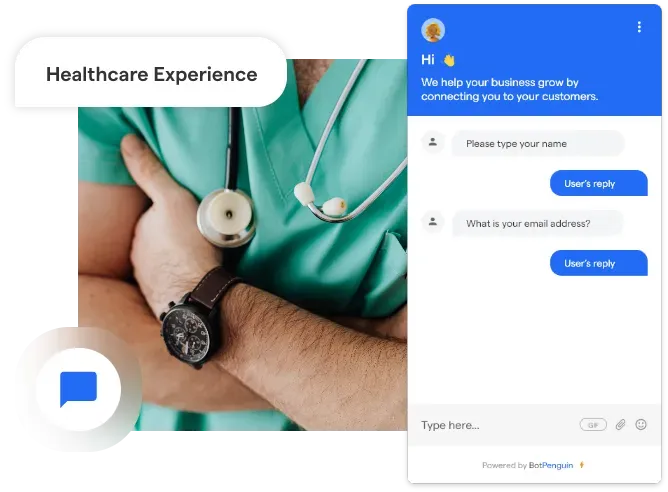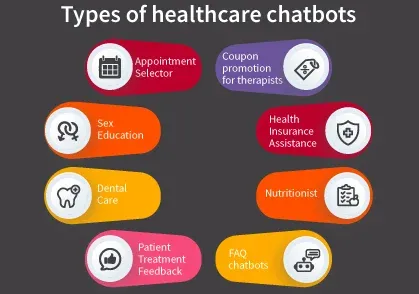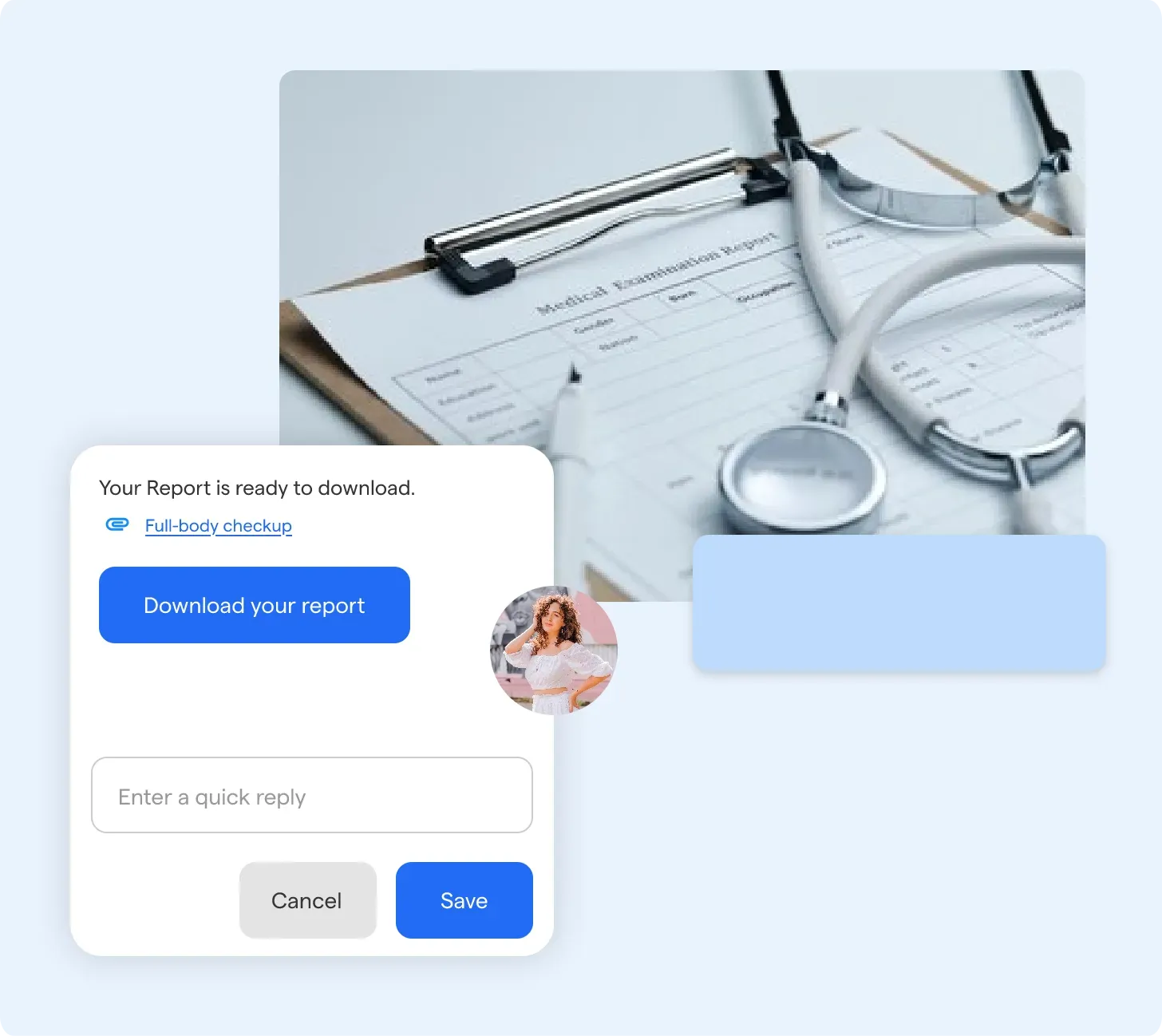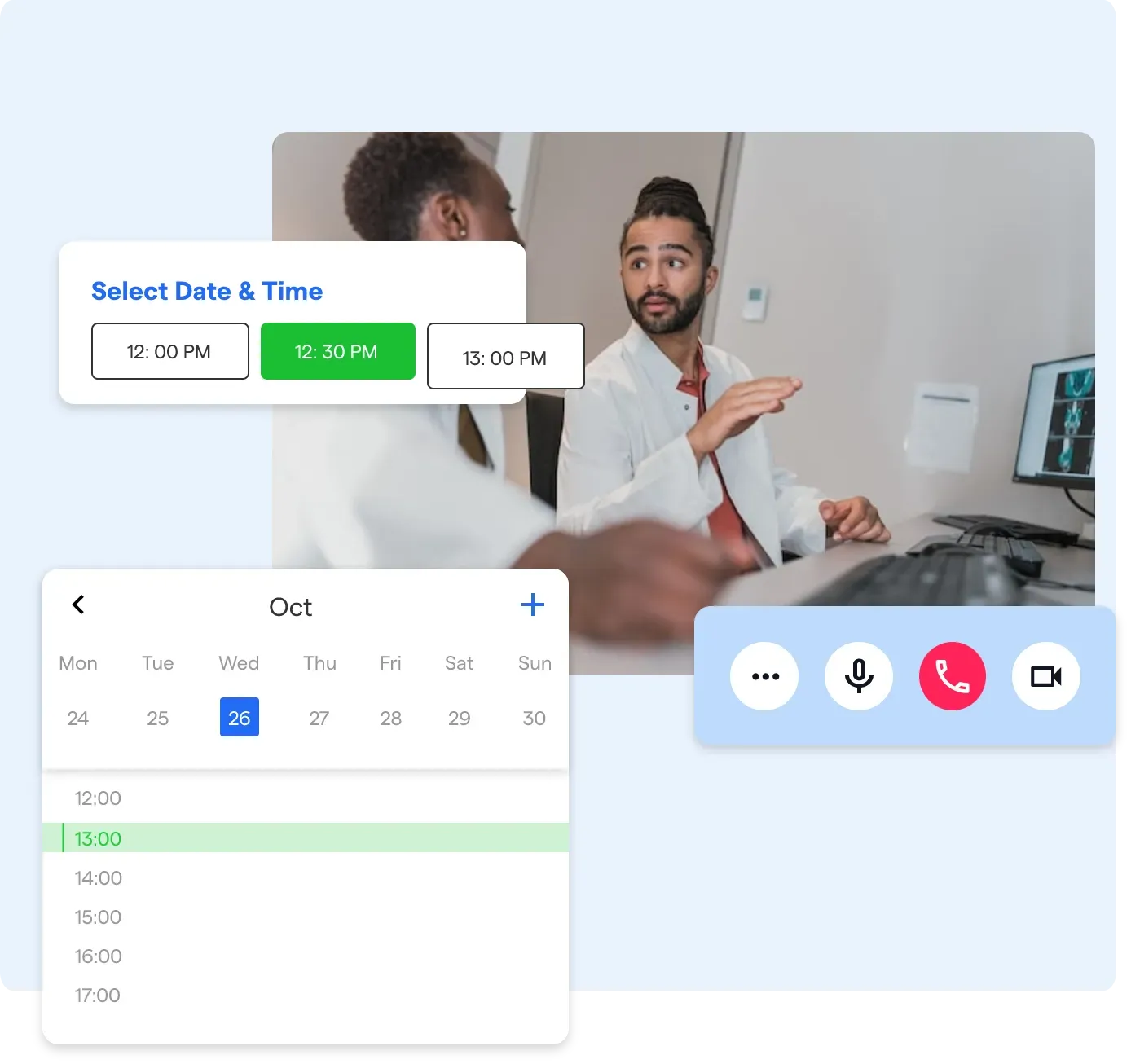Undoubtedly, the healthcare business is undergoing fast transformation and technological improvements every year.
Artificial intelligence (AI), Neuro-Symbolic AI, and Natural Language Processing (NLP) are just a few of the many advances in hospital systems, research labs, and doctor offices.
Virtual assistants and AI-powered conversational chatbots have taken center stage recently, appearing in hospitals, labs, pharmacies, and even nursing homes. With good reason. Customers expect rapid and convenient interactions in the age of digital customer experience.
In fact, according to recent studies by Grand View Research, the global chatbot market in healthcare is projected to reach a whopping $703 million by 2025.
Chatbots in the healthcare business save professionals a lot of time by automating a medical representative's routine and lower-level responsibilities.
But that's not all.
They collect and store patient data, ensure its encryption, allow patient monitoring, provide various informational support, and provide larger-scale medical assistance.
Let us learn more about the benefits and use of chatbots in healthcare.
Why Use Chatbots in Healthcare?
The healthcare industry is undergoing a digital transformation, and chatbots are emerging as valuable tools in this evolution.
These AI-driven conversational agents are making their presence felt, offering a range of benefits that improve patient care, streamline operations, and enhance the healthcare experience.
Improving patient experience
Chatbots offer a convenient and user-friendly way for patients to access healthcare information and services. They provide instant responses, eliminating the need for long wait times or navigating complex websites.

Enhancing efficiency and productivity
By automating routine tasks, chatbots free up healthcare professionals' time, allowing them to focus on more critical and complex responsibilities.
Chatbots can handle appointment scheduling, answer frequently asked questions, and provide basic medical advice, reducing administrative burdens and increasing efficiency.
Reducing healthcare costs
Implementing chatbots can lead to significant cost savings for healthcare organizations.
Chatbots can streamline operations and optimize resource allocation by automating processes and reducing human intervention.
Ensuring 24/7 availability
One of the most significant advantages of chatbots is their round-the-clock availability. Patients can access healthcare information and support anytime, even outside regular office hours.
Types of chatbots in healthcare
Regarding healthcare, chatbots come in various forms, each serving a specific purpose. Let's take a look at a few common types:
- Symptom Assessment Chatbots
These chatbots help users evaluate their symptoms and recommend further action, such as seeking medical attention or self-care measures.
- Appointment Scheduling Chatbots
These chatbots streamline booking appointments with healthcare providers, saving time and reducing administrative burdens.
- Medication Management Chatbots
These chatbots assist patients in managing their medications, sending reminders for dosage schedules and refills.

- Health Education Chatbots
These chatbots deliver valuable health information, answer questions, and provide educational resources on various medical topics.
- Mental Health Support Chatbots
These chatbots offer emotional support and guidance for individuals with mental health issues, providing coping strategies and resources.
- Chronic Disease Management Chatbots
These chatbots help patients with chronic conditions monitor their symptoms, track progress, and receive personalized care plans.
Who Can Benefit from Healthcare Chatbots?
Healthcare chatbots benefit a wide range of stakeholders within the healthcare ecosystem. Here's a breakdown of who can benefit from healthcare chatbots:
Patients
Patients are the primary beneficiaries of healthcare chatbots. They can access reliable medical information, receive personalized support, and conveniently schedule appointments or access telemedicine services.

Healthcare providers
Healthcare professionals can leverage chatbots to streamline their workflows and improve patient care. Chatbots can handle administrative tasks, provide decision support, and triage patients.
Insurance companies
Insurance companies can utilize chatbots to enhance customer support and streamline claims processing.
Chatbots can assist policyholders in understanding their coverage, answering policy-related queries, and guiding them through the claims process.
This improves customer satisfaction and reduces the workload on insurance company staff.
Pharmaceutical companies
Pharmaceutical companies can leverage chatbots to provide medication information, offer medication schedule reminders, and assist in reporting adverse events.
Chatbots can also aid clinical trial recruitment, matching eligible participants with ongoing studies.
Suggested Reading:
Appointment Booking chatbot solutions for hospitals by BotPenguin
How Do Healthcare Chatbots Work?
Healthcare chatbots operate through artificial intelligence (AI) and natural language processing (NLP) technologies.
Here's a simplified overview of how healthcare chatbots work:
Natural Language Processing (NLP)
At the heart of chatbot functionality lies Natural Language Processing (NLP). This technology enables chatbots to understand and interpret human language, allowing seamless communication.
NLP algorithms analyze user queries, identify keywords, and generate appropriate responses.
Machine Learning algorithms
Machine Learning (ML) algorithms are crucial in improving chatbot performance over time.
Chatbots can learn from past conversations by analyzing user interactions and feedback and adapt their responses accordingly.
ML algorithms help chatbots become more accurate, efficient, and personalized in their interactions.
Integration with Electronic Health Records (EHR)
Healthcare chatbots can integrate with Electronic Health Records (EHR) to provide comprehensive and personalized care.
This integration allows chatbots to access relevant patient information, such as medical history, allergies, and medications. By leveraging EHR data, chatbots can offer tailored recommendations and guidance.
Security and privacy considerations
Given the sensitive nature of healthcare data, security and privacy are paramount. Healthcare chatbots employ robust security measures to protect patient information.
Encryption, secure data storage, and adherence to healthcare regulations, such as HIPAA, ensure that patient data remains confidential and secure.
Key Factors to Consider When Choosing a Healthcare Chatbot
Choosing the right healthcare chatbot for your organization involves carefully considering several key factors.
Here are the essential elements to evaluate when selecting a healthcare chatbot:
Customization and personalization capabilities
Every healthcare organization has unique requirements.
Look for a chatbot with customization options to align with your specific workflows and patient population. The ability to personalize responses based on individual patient data can enhance the user experience and improve outcomes.
BotPenguin is an effective chatbot that can automate various healthcare-related operations, such as answering patients' questions and organizing appointments.
Additionally, BotPenguin can deliver personalized care, increasing patient happiness and outcomes.
And with BotPenguin you get to serve your patients on the platform they are:
Integration with existing systems
Choose a chatbot like BotPenguin that seamlessly integrates with your existing systems, such as appointment scheduling software or EHR platforms, to maximize efficiency.
Integration ensures smooth data flow and minimizes manual data entry, saving time and reducing errors.
Scalability and flexibility
As your organization grows, the chatbot should be able to handle increased user demand without compromising performance. Additionally, the chatbot should be adaptable to evolving healthcare needs and technological advancements.
Compliance with healthcare regulations
Compliance with healthcare rules such as HIPAA is a must. Ensure the chatbot solution adheres to the security and privacy standards to protect patient data.
A reputable chatbot provider will prioritize compliance and provide the necessary safeguards.
Factors to Consider for Patients
When considering healthcare chatbots from a patient's perspective, several crucial factors come into play:
User-friendly interface
A patient-friendly chatbot should have an intuitive and user-friendly interface. The chatbot should be easy to navigate, with clear instructions and prompts.
A visually appealing design and simple interactions can enhance the user experience and encourage patient engagement.
Accessibility features
To cater to diverse patient needs, accessibility features are crucial. Look for chatbots that offer options for text-to-speech or speech-to-text capabilities.
Additionally, consider compatibility with assistive technologies, such as screen readers, to ensure inclusivity for patients with disabilities.
Accuracy and reliability of information
Patients rely on chatbots for accurate and reliable information.
Choose a chatbot like BotPenguin, backed by reputable sources and regularly updated with the latest medical knowledge. The chatbot should provide evidence-based information and indicate any limitations or disclaimers.
Use Cases of Healthcare Chatbots
Healthcare chatbots find applications in various scenarios across the healthcare industry. Here are some prominent use cases:
Appointment Scheduling and Reminders
One of the primary uses of healthcare chatbots is to assist patients in scheduling appointments with healthcare providers.
Chatbots can streamline the process by offering real-time availability, helping patients find suitable time slots, and sending automated reminders to reduce no-shows.

Symptom Assessment and Triage
Chatbots with advanced natural language processing capabilities can interact with patients to assess their symptoms and provide initial triage.
Chatbots can offer preliminary guidance on whether a patient should seek immediate medical attention or schedule a non-urgent appointment by asking relevant questions and analyzing responses.
Medication Management and Adherence
Managing medications can be challenging, especially for patients with complex medication regimens.
Healthcare chatbots can assist in medication management by sending reminders for taking medications, providing dosage instructions, and answering questions about potential side effects or drug interactions.
Conclusion
The healthcare industry is rife with scenarios that need to be automated to improve and streamline service delivery. Offloading simple use cases to a chatbot can enable healthcare personnel to focus on patient care.
Healthcare chatbots make your brand available to your patients 24 hours a day, seven days a week, making your healthcare center synonymous with around-the-clock service. Continuous connection with your brand and following their requirements results in satisfied patients who feel cared for.
Ultimately, the best chatbot for healthcare will depend on your specific needs and requirements.
For that, you must go for BotPenguin.
We collaborate with major healthcare providers to install chatbots and virtual assistants that handle medical diagnosis, appointment scheduling, data entry, in-patient and out-patient inquiry resolution, and customer service automation
Frequently Asked Questions (FAQs)
What factors should I consider when choosing a chatbot for healthcare?
When selecting a chatbot for healthcare, factors include integration capabilities, customization options, security and compliance, natural language processing capabilities, scalability, and cost-effectiveness.
How can a chatbot improve the patient experience in healthcare?
Chatbots can enhance the patient experience by providing instant responses, personalized support, and convenient healthcare information and services access.
What are some common use cases of healthcare chatbots?
Healthcare chatbots can be used for appointment scheduling, symptom assessment, medication management, health education, and mental health support, among other applications.
How can chatbots benefit healthcare providers?
Chatbots can streamline workflows, improve efficiency, and allow healthcare providers to focus on more critical tasks by handling administrative duties and providing decision support.
What are the security considerations when implementing a healthcare chatbot?
It is crucial to ensure that the chatbot solution follows strict security protocols, such as encryption and secure data storage, to protect patient information and comply with healthcare regulations.


